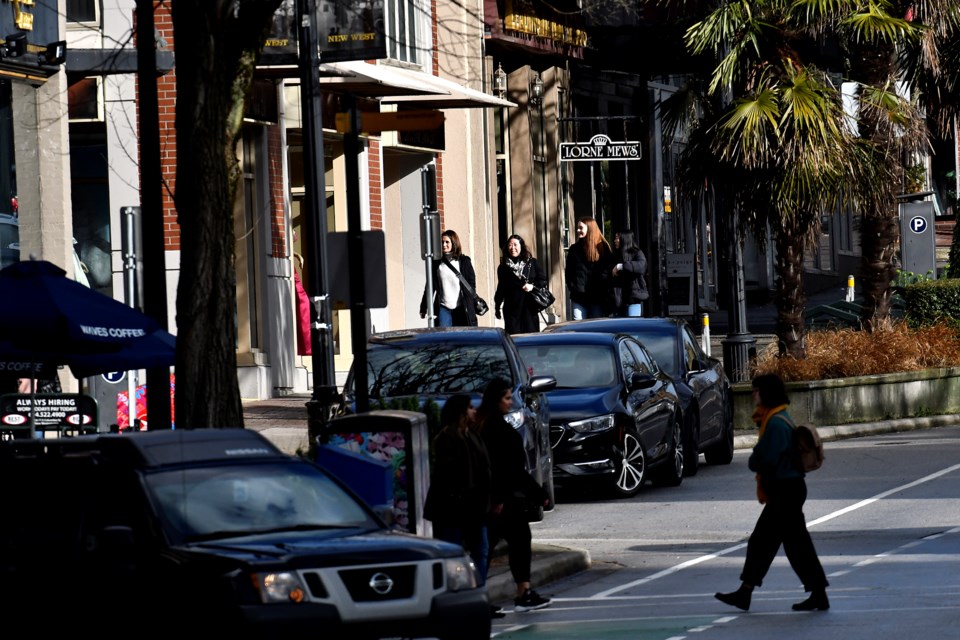Two business organizations in New Westminster have expressed “grave concerns” about the impacts of potential Trump trade tariffs.
The New Westminster Chamber of Commerce and the Downtown New West Business Improvement Association joined forces on a Feb. 3 letter to the federal minsters of foreign affairs and economic development and innovation.
In the letter, Angelene Prakash, Downtown New West BIA executive director, and Rich Patterson, chair of the chamber’s board, urged the federal and provincial governments to take decisive action to mitigate the disruptions the tariffs will cause and to work towards a stable and constructive trade relationship with the United States, Canada’s largest trading partner.
“The imposition of new tariffs by the United States will have immediate and significant impact on our local and regional businesses, particularly in the areas of supply chain logistics, shipping costs, cross-border sales, hiring capacity, and overall inflationary pressures,” said the letter.
“Many businesses in New Westminster and the Lower Mainland rely on trade with the U.S. for raw materials, finished goods, and key business partnerships. Increased costs due to tariffs will hinder their ability to remain competitive, limit growth opportunities, and place additional strain on consumers who are already facing economic challenges,” it continued.
In addition to the direct financial consequences, the local business leaders said uncertainty surrounding trade relations could further erode investor confidence and delay critical business expansion efforts.
“Our members are already reporting concerns about the sustainability of operations should these tariffs remain in place without an effective counter-strategy from the Canadian government,” said the letter.
On Feb. 4, U.S. President Donald Trump signed an executive order to impose 25 per cent tariffs on all Canadian imports, with a lesser 10 per cent tariff on Canadian energy. The move came after weeks of threats by the U.S. president about imposing tariffs on Canadian and Mexican imports.
On Feb. 1, Prime Minister Justin Trudeau announced Canada would be responding to the U.S. trade action with 25 per cent tariffs against $155 billion worth of American goods, with tariffs on $30 billion worth of goods set to begin on Feb. 4 (the same day the U.S. tariffs were to take effect). He said additional tariffs on $125 billion worth of American products would follow in 21 days' time in order to give Canadian companies and supply chains an opportunity to find alternatives.
During Saturday night’s announcement, Trudeau said Canada had already launched a $1.3-billion border plan that is already showing results. (Trump has cited concerns about fentanyl crossing from Canada into the United States as a reason for imposing tariffs.)
Tariffs paused
On Tuesday, the day the tariffs were set to be introduced, Trump and Trudeau announced the tariffs would be “paused” for up to 30 days.
In the weeks and days leading up to the expected introduction of the tariffs, many Canadians have been considering how they could better support businesses in Canada by buying Canadian products. Governments across the country started taking a variety of steps, including removing some American-made products from the shelves at government liquor stores.
In the Feb. 3 letter, the BIA and chamber urged both levels of government to take immediate steps to secure stability for Canadian businesses by:
- Engaging in diplomatic negotiations with the U.S. to seek exemptions or reductions on key sectors affected by the tariffs.
- Providing targeted support programs for businesses facing significant tariff-related cost increases.
- Developing a long-term strategy to strengthen Canada’s trade position, including diversifying markets and reinforcing key North American trade agreements.
“The New Westminster Chamber of Commerce and the Downtown New west BIA are committed to fostering economic resilience and prosperity in our community. We stand ready to collaborate with federal and provincial leaders to ensure our businesses have the tools and support needed to navigate these challenges,” said the letter. “We would welcome the opportunity to discuss this matter further and explore potential solutions that will benefit both our local economy and the broader Canadian business landscape.”
On Feb. 5, Trudeau announced a Canada-U.S. economic summit would be held in Toronto on Feb. 7, bringing together trade and business leaders and representatives of organized labour to discuss strategies to expand the economy, break down internal trade barriers and diversify exports.





